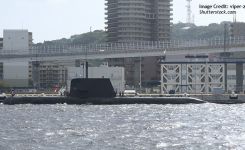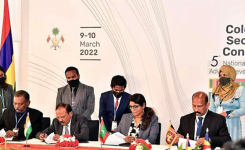- Near East South Asia Center for Strategic Studies
- NESA Center Alumni Group
- Gulf Region
- Faculty Publication: "Indo-Pacific reluctance a...
Faculty Publication: "Indo-Pacific reluctance and the gulf: an examination of maritime domain awareness as an influence shaping regional maritime security efforts" by Jeffrey Payne

On 08 November 2023, the Journal of the Indian Ocean Region published NESA Center Assistant Professor Jeffrey Payne's paper "Indo-Pacific reluctance and the gulf: an examination of maritime domain awareness as an influence shaping regional maritime security efforts" in its Volume 19, 2023 - Issue 1: Gulf States and the Indo-Pacific: Agents or Objects of Geopolitical Competition?
ABSTRACT
Maritime security, while a challenge for littoral states in the Gulf region, has not evolved to reflect global maritime trends. The maritime challenges in the Gulf region point out the necessity of reforming approaches to maritime security and investing in a greater understanding of how the global commons will define the health of individual Gulf states. This paper examines how Gulf states, despite enjoying modern maritime forces, remain fixated on traditional mechanisms for addressing maritime threats. Using a Maritime Domain Awareness framework for analysis, this paper argues that Gulf states lag in information sharing processes tied to maritime security operations that have become a common approach in the Indo-Pacific. Without greater investment by Gulf maritime services into the information sharing arrangements, the Gulf becomes more vulnerable.
About the Author

Jeffrey Payne is an Assistant Professor at the Near East South Asia (NESA) Center for Strategic Studies. He pilots NESA’s maritime security programming, including its ongoing series devoted to the Indian Ocean Region and wider Indo-Pacific. In addition, he leads NESA’s engagements relating to maritime and littoral information sharing/data analysis.
About the Publisher
The Journal of the Indian Ocean Region publishes interdisciplinary social science and policy research on the nature and impact of the human uses of the Indian Ocean Region (IOR), and works to increase knowledge of a wide range of traditional and non-traditional security threats in order to maintain peace and stability in the IOR.
The views presented in this article are those of the speaker or author and do not necessarily represent the views of DoD or its components.


